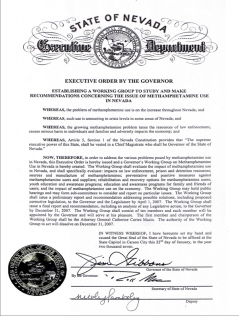A panel appointed by Nevada Gov. Jim Gibbons to study responses to methamphetamine use, manufacture, and trafficking in the state called last Friday for more treatment, more prevention, more police, and more laws restricting precursor chemicals, but rejected a bill that would have increased penalties for meth offenses. In its Preliminary Report, the Governor's Working Group on Methamphetamine Use warned that while home meth lab busts are down, Nevada is first in the nation in per capita lifetime meth use, past year meth use, and past month meth use.

The group also made recommendations about specific methamphetamine-related legislation before the legislature. It supported one bill, AB 148 that would impose state-level restrictions on the sale of meth precursors, but rejected a harsher one, AB 150, that would have required a prescription to obtain cold medications containing drugs like pseudoephedrine. It also rejected two measures that would have ratcheted up sentencing. The first, AB 116, would have reduced the amount of meth needed to trigger trafficking charges from four grams to three, while the other, AB 281 would have made possession of the tiniest trace of any Schedule I drug except marijuana a potential trafficking offense.
While the panel recommended restraining legislators' efforts to pile-on the meth penalties, it did not mention harm reduction and discussion of alternatives to drug prohibition were clearly not on the agenda. That is not surprising, given the panel's make-up, which included seven law enforcement officials, four elected officials, the head of the Department of Health and Human Services, a health care executive, a school superintendent, a newspaper publisher, and the governor's wife. No harm reductionists or apparent past or present methamphetamine users were represented.
This work by StoptheDrugWar.org is licensed under Creative Commons Attribution-ShareAlike 4.0 International
Add new comment